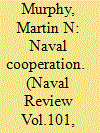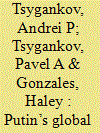| Srl | Item |
| 1 |
ID:
128667


|
|
|
|
|
| Publication |
2013.
|
| Summary/Abstract |
The author, a senior fellow of the Atlantic Council in Washington, DC and vising fellow at the Corbett centre for Maritime Policy studies, King's college, London, examines the idea of cooperation between the Anglophone navies to compensate for the declining strength of each of theme individually. He looks beyond comforting language about cooperation to what it might mean on the ground in real in real material terms. An earlier version of this article was published by the Atlantic Council and Rusi in September 2012.
In the unrelenting struggle of peoples, those ascendant at sea have, at least in the modern era, proved consistently successful either singly or in alliance against those with a territorial power base- Peter Padfield.
|
|
|
|
|
|
|
|
|
|
|
|
|
|
|
|
| 2 |
ID:
178808


|
|
|
|
|
| Summary/Abstract |
Despite the reputation of being objective and non-partisan, experts
frequently validate concepts and ideas popular within the dominant elite
circles. To support this argument, we have taken a closer look into the
Atlantic Council (AC), an American think tank with clear preferences for the
U.S.-centered international order and NATO as the foundation of security in
Europe. We argue that these preferences have translated into anti-Russian
bias in AC publications. This is evident in the organization’s reliance on
the concept of global hybrid war in describing goals and means of Russian
foreign policy since 2014. We base our analysis on a sample of articles on
Russia and “hybrid war” published by the AC’s experts between 2014 and
2020. In establishing the AC’s pro-NATO and anti-Russian biases, we analyze
the articles’ frames as well as the political and institutional preferences held
by the organization.
|
|
|
|
|
|
|
|
|
|
|
|
|
|
|
|